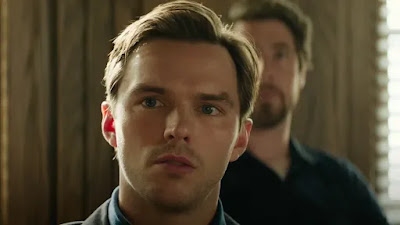It's interesting, even oddly philosophical talk, nevertheless, geared towards the revelation that everyone on screen has their own doubts and biases. During jury pool, our onscreen judge for the evening states that the fact no-one wants to be here makes everyone a perfect candidate for jury duty. Juror #1 and Jurors #3-12 soon regard this as an open-and-shut case, that the recessive accused (Gabriel Basso, formerly the clean-cut teen star of Super 8 and The Kings of Summer, more recently JD Vance in Hillbilly Elegy) is clearly guilty from the outset. Juror #2 has his own, ever-swelling reason to railroad this guy: a heavily pregnant wife (Zoey Deutch) waiting for him back home, along with a new life to make up for the one he's taken, if such a concept is permissible. Everyone has other things they could be getting on with: the Collette character is hoping a conviction will help boost her campaign for high political office. Unlike the absolute liberal certainties of 1957's 12 Angry Men, a picture Eastwood must have admired even if he quibbled with its politics, Juror #2 is forever looking to squirrel out ambiguities. The lawyers may get together after hours to toast the justice system - "it's not perfect, but it's the best we've got", upholding the verdict of those Grisham bestsellers - but Eastwood has lived long enough to hope for something more reliable and less volatile. Every one of these characters has butterflies of some kind in their stomach, which makes a thoroughly 1994-looking production feel newly 2024; these butterflies eventually migrate outwards to the viewer, faced with what has, by the halfway mark, developed into a genuinely unpredictable thriller. There's precisely nothing open-and-shut about this particular case.
There's also nothing overly flashy about Eastwood's crisp, clear and characteristically self-effacing direction; he sets about this tale as he almost always has, deploying the formal building blocks he first saw on set in the 1950s and first picked up for himself in the 1970s. Yet each set-up serves as a confession of the director's own biases: a fondness for groups of good actors, studies of conflicted souls and imperfect characters, professionals doing the best job they can in challenging circumstances, be that within the justice system or the remains of the studio system. As a consequence, the screen starts to flood with an unexpected (because rare) moral seriousness. You could well envisage another, pulpier retelling of this plot - something closer to Runaway Jury, say - with a trickster hero leading the other jurors astray. Lighter touches make themselves apparent from time to time here: the camaraderie between the Collette and Messina characters, the fact they meet up in a bar called Rowdy's Hideaway, surely a nod on production designer Ronald R. Reiss's part to the Eastwood of yore. But the Eastwood of 2024 shoots close-ups that recast his title character, a compromised cog in a malfunctioning machine, as an American Raskolnikov, eaten up from the inside by a secret shared only with us. Does he feel lucky, this punk, to have a second chance at correcting the wrongs of his past? What do we do with everything we've seen and done? How do we live with the guilt we've accrued? If in God we trust, what to do about our fallible fellow man? And what, finally, does true justice looks like? These are extraordinarily big and profound questions to find floating around inside a multiplex, this of all weeks in the great and perilous American experiment.
Juror #2 is now playing in selected cinemas.

No comments:
Post a Comment